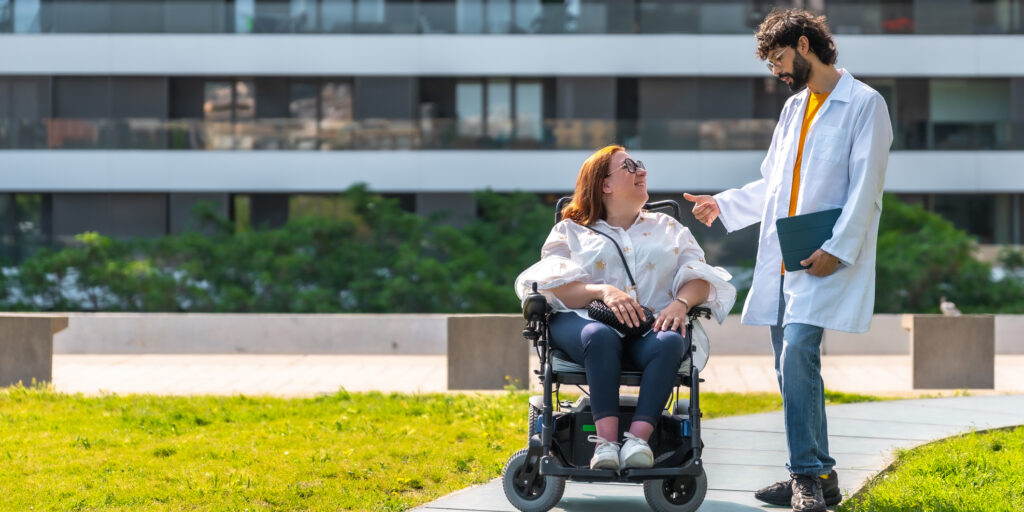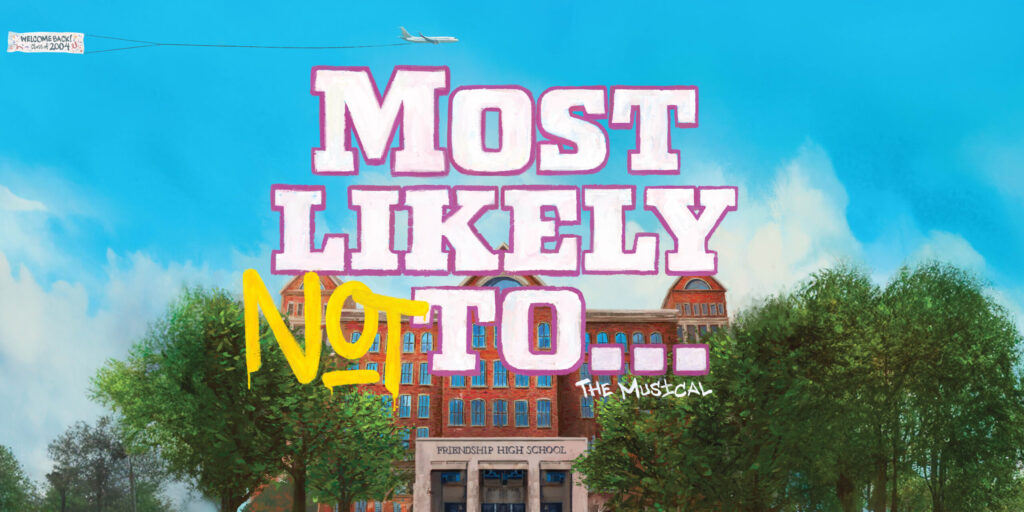
Inclusion Outshines Ableism on the Big Stage
By Rebecca Hume | Monday, February 26, 2024
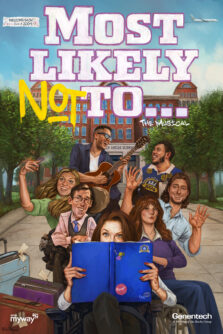
Most Likely Not To… will debut on Rare Disease Day, February 29, 2024.
The disability community is making history this year with a first-of-its-kind musical production created from start to finish by members of the spinal muscular atrophy (SMA) community. Debuting on Rare Disease Day, February 29, Most Likely Not To… is an original musical that offers a fresh and candid look at life with a disability. Centering around themes of accessible travel needs and the pervasion of ableism in our society, the play brings to light many of the issues important to the disability community.
Using humor and real-life experiences of those living with SMA, the show ridicules the absurdity of inaccessible travel while sharing a story about self-acceptance, identity, and internalized ableism. The title, a take on high school superlatives with a dig at the erroneous societal belief that people with disabilities are “most likely not to” have lives enriched with relationships, careers, and successes, foreshadows the plot and message of the production.
Written, directed, and performed by members of the SMA community, Most Likely Not To… delivers a story about Samantha, a fashion designer, and her childhood arch nemesis, Ella, as they reunite at their high school reunion. The musical stars actress and singer Shannon DeVido and others who are living with SMA, including a cameo from two of the SMA community’s premier disability rights advocates, YouTubers and married couple, Shane and Hannah Burcaw. Rich with music, comedy, romance, and important motifs, the play aims to illuminate the challenges that people with disabilities face while traveling and the general challenges that ableism creates in day-to-day life and self-identity. As the characters confront the dichotomy of who they were and who they have become, their story shares valuable insights about growth, acceptance, and inclusion.
Collaborating for change
Similar to the 2022 Double Take Fashion Show, Most Likely Not To… is a collaboration between the SMA community and Genentech’s SMA My Way program. Genentech, the biotechnology company responsible for the FDA approved SMA treatment, Evrysdi, is dedicated to amplifying the voices and experiences of those who have been historically underrepresented or misrepresented in various areas of society, including the entertainment world. Launched in 2020, SMA My Way is a program designed to empower people impacted by SMA and help them live their best lives, their way.

Adam Pryor, Communications Leader at Genentech, served as Creative Director for Most Likely Not To…
Adam Pryor, Communications Leader at Genentech, served as Creative Director for the production, engaging theater industry professionals to help write, direct, and produce the show. “As part of SMA My Way, Genentech brought together a diverse, creative team from the SMA community to brainstorm ways to share their experiences with the world,” Adam says. “SMA community members envisioned a musical comedy – Most Likely Not To… – that uses subversive satire, sharp wit, and show-stopping songs to convey a fresh and startling look at life with a disability that is relevant to everyone.”
Adam shares that during the days leading up the Double Take Fashion Show, the custom power wheelchair of one of the participants traveling for the show was damaged beyond repair by the airline. Upon arriving in New York City for the show, she was trapped in her hotel room for days while waiting for a temporary replacement – one that, once she received, she was not able to drive independently. Unfortunately, her story is not rare as travelers with wheelchairs are required to surrender their wheelchairs, often resulting in damage, and are also forced to withstand the indignity, discomfort, and danger of manual transfers by untrained airline staff. After witnessing the injustices and dangers that many travelers with disabilities face, Genentech decided to use their resources to support and sponsor a community-led creative project that could advocate for systemic changes in accessible air travel.
“During an SMA community brainstorm, it became clear that this issue is highly personal to the community and runs much deeper than a lack of space on airlines,” Adam says. “Like many challenges the community faces, it is ultimately rooted in ableism. From there, the SMA community identified other ways that ableism negatively impacts their lives and dreamt up ways to subvert ableism through dark comedy. The end result was Most Likely Not To…”
Challenges of air travel (in)accessibility
For SMA community members participating in the production of Most Likely Not To…, barriers to safe and accessible air travel hit close to home. Shannon shares that airplane inaccessibility, the risk of damaged equipment, having to travel with a companion, and not being able to stay in her powerchair on a flight are issues that she has experienced while traveling. She hopes that the play can illustrate that people with disabilities not only do travel (as an ableist mindset might infer that people with disabilities don’t travel), but that they also face increased difficulties when doing so, and that change is both necessary and possible. One key change that could alleviate a large number of barriers and risks for traveling wheelchair users would be the provision of and access to wheelchair spaces so that individuals could remain in their chairs during flight.

Shannon DeVido stars in the musical Most Likely Not To…
Shane and Hannah have also experienced the challenges of air travel and the need for wheelchair spaces on planes. “For me, it’s the simple, yet monumental, obstacle of being physically unable to sit upright in the airplane seat,” Shane says. “Since we are not allowed to remain in our wheelchairs on flights, I’m forced to use an uncomfortable, impractical, and unsafe child’s car seat to keep me precariously upright during the flight.”
“Not to mention the high likelihood that when we arrive at our destination, Shane’s wheelchair is often damaged or broken,” Hannah adds. “Wheelchairs are treated like luggage and are mishandled and destroyed at an alarming frequency.”
Even with an increase in social media content and diligent advocacy efforts to raise awareness and create meaningful change in accessible air travel, many people outside of the disability community are often unaware of the pressing issues. “Many people are still shocked to learn about the inaccessibility of air travel,” Shane says. “When they become aware of it, they’re outraged. I hope this show continues to make people feel passionate about fixing this systemic problem.”
In addition to raising awareness about inaccessible air travel, Most Likely Not To… endeavors to address the broader implications of ableism within our society and the barriers and challenges that this mindset creates for those living with disabilities.
Raising awareness with humor and representation
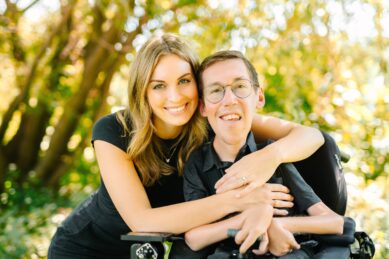
Hannah and Shane Burcaw helped write the script and have a cameo in Most Likely Not To…
While accessible air travel needs, ableism, and the need for more inclusion are considerably heavy themes, Most Likely Not To… is ultimately a comedy, using humor to spread important messages. Shannon, Shane, and Hannah each share that in addition to inspiring people to question their assumptions about disability, their over-arching goal is to make people laugh.
“Hannah and I were on the writing team as well,” Shane says. “My favorite part has been seeing the script and the humor get elevated with each subsequent revision. And seeing the many diverse perspectives come to life in the show has been really cool.”
Representation of diverse perspectives and the experiences of those living with disabilities lend critical authenticity to the production. With creators and a cast of individuals living with SMA, Most Likely Not To… embodies and promotes meaningful representation in the entertainment industry.
“People throw around the phrase ‘representation matters’ a lot, but it really does. Seeing yourself represented on screen changes how you feel about your worth and your value in being included in our society,” Shannon says. “Everyone deserves a voice and a seat at the table. Going one step further, when that work is developed by artists with disabilities, it gives an authentic representation of the disabled experience, which then brings awareness, and that leads to change and broader inclusion. The arts are powerful.”
Currently, there is an undeniable trend of broader inclusion and increased representation in the entertainment industry, as individuals in the disability community demand a seat at the table.
Trending in the right direction
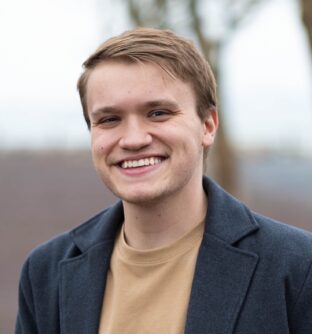
Jess Westman wrote Wheels: An Original Musical.
Most Likely Not To… will significantly add to the momentum of increased and authentic representation in the arts. Productions like 504: The Musical, Coda, Wheels: An Original Musical, and the new Broadway musical, How to Dance in Ohio, are staking a claim to the disability community’s right to be seen and heard on stage.
Jess Westman, who wrote Wheels: An Original Musical, is a New York based writer, composer, lyricist, actor, and disability activist living with Becker muscular dystrophy (BMD). Jess speaks to the value of representation and the meaningful impact of increased accessibility and acceptance in the industry.
“The representation of the disability community – each story so diverse and beautifully unique – is vital to the entertainment industry because there was a time when not a single story of ours was even heard,” he says. “Each new project focusing on a different facet of disability life continues the inclusivity conversation on an honest level. It comes down to a question of not just how much disability authenticity that able-bodied producers, directors, and creative leads are willing to incorporate into their stories, but now, how we can tell our stories instead.”
Jess had the opportunity to further share his story and message when a group of Columbia University graduate students selected him and his play as the subject of their documentary project for a class focusing using film as teaching material for public policy. Emily Muller, a second year Master of International Affairs student at Columbia who lives with distal myopathy, came across Wheels on MDA’s Instagram page and recognized an opportunity to initiate a broader conversation on disability access and inclusion in the arts space. Emily and two of her graduate student classmates, Anna Cheng and Shannon Wade, produced the documentary Wheels of Change: Bringing Disability Inclusion to Broadway, which was screened at the Open Society University Network film festival with students from across the world.

Emily Muller co-produced the documentary Wheels of Change: Bringing Disability Inclusion to Broadway.
“Ultimately, we wanted the film to propose practical avenues to change, such as advocating for authentic casting, improving accessibility in performing arts venues, and establishing funding mechanisms to empower artists with disabilities,” she says.
Emily’s advice to others living with a disability and vying for a seat at the table in the entertainment industry, and other industries, is to keep creating. And that it is okay to find humor in life, to be blunt, to demand space, and to share their stories and experiences.
Finding humor in an often challenging reality while educating audiences about life with a disability and embracing the joy, community, and creativity of the arts, just as Most Likely Not To… does, creates a meaningful and valuable medium to increase awareness and promote authentic representation. Representation that ultimately reminds others in the disability community that they are not alone, that their stories matter, and that they deserve a space in the spotlight.
Next Steps and Useful Resources
- Most Likely Not To… will be streamed live and available on-demand after the show.
- Check out the first single from Most Likely Not To…
- Check out music videos of original songs from Wheels: “Running” and “Uphill Battle” or follow Wheels’ official pages on Instagram or TikTok
- Watch the documentary Wheels of Change: Bringing Disability Inclusion to Broadway
- Learn more about SMA My Way
- Learn more about inclusion and representation in entertainment by listening to these three Quest Podcasts: Lights, Camera, Action – and Accessibility: Part 1, Part 2, and Part 3.
- Stay up-to-date on Quest content! Subscribe to Quest Magazine and Newsletter.
Disclaimer: No content on this site should ever be used as a substitute for direct medical advice from your doctor or other qualified clinician.


